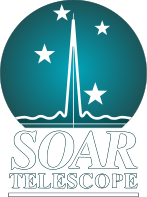Setup for Remote Use#
The Goodman Spectroscopic Data Reduction Pipeline has been installed on a dedicated computer at SOAR. The procedure requires to open a VNC session, for which you need to be connected to the SOAR VPN. The credentials for the VPN are the same you used for your observing run, provided by your Support Scientist, who will also give you the information for the data reduction computer VNC connection.
Note
IRAF is available in the data server at SOAR. Running iraf will
open an xgterm and ds9 windows. iraf-only will open xgterm but
not ds9
Establish a VNC connection#
Separately, you should receive a server hostname, IP, display number and VNC-password.
Display |
Partner/Institution |
Folder |
|---|---|---|
:1 |
NOAO |
|
:2 |
Brazil |
|
:3 |
UNC |
|
:4 |
MSU |
|
:5 |
Chile |
|
For this tutorial we will call the vnc server host name as <vnc-server>
the display number is <display-number> and your password is <password>.
The VNC connection should work with any VNC Client like TightVNC, TigerVNC,
RealVNC, etc. The first two run on Linux and can be used directly with the
vncviewer command line.
Important
Please, help us to create an organized enviroment by creating a new folder
using the format YYYY-MM-DD within your institution’s directory and
using it to process your data.
VNC from the Terminal#
Find the <display-number> that corresponds to you from the VNC Displays table.
Open a terminal, and assuming you have installed vncviewer.
vncviewer <vnc-server>:<display-number>
You will be asked to type in the <password> provided.
Important
The real values for <vnc-server> and <password>
should be provided by your support scientist.
If the connection succeeds you will see a Centos 7 Desktop using Gnome.
